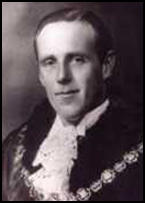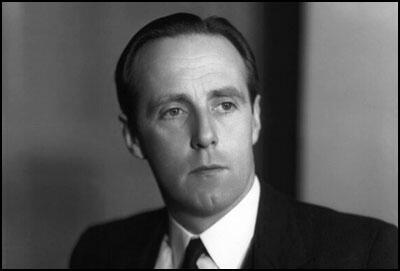Herbrand Sackville, 9th Earl De La Warr

Herbrand Sackville, the son of Gilbert Sackville, 8th Earl De La Warr and Muriel De La Warr, was born at Bexhill on 20th June, 1900. His parents marriage had been in difficulty for some time and they were divorced in 1902.
Whereas his father was a strong supporter of the Conservative Party, his mother, was a Liberal and an active member of the National Union of Women's Suffrage Societies. Herbrand's own political views were closer to those of his mother and at Eton and at Magdalen College, Oxford, began expressing socialist views.
In 1915 Gilbert Sackville, 8th Earl De La Warr, was killed in the First World War, Herbrand inherited his father's title and became the first hereditary peer to take his seat in the House of Lords as a supporter of the Labour Party. Sackville was a conscientious objector during the First World War but although unwilling to take part in active combat, did join the Royal Naval Reserve (trawler section) in 1918.
In 1924, Ramsay MacDonald, Britain's first Labour Party Prime Minister, appointed Sackville as his lord-in-waiting. In MacDonald's second administration he was parliamentary under-secretary at the War Office (1929-30) and at the Ministry of Agriculture (1930-31).
De La Warr agreed to join MacDonald's National Government in 1931 and served successively as parliamentary secretary to the Ministry of Agriculture (1931), deputy minister to the Department of Fisheries (1931-35), parliamentary secretary to the Board of Education (1935-36) and parliamentary under-secretary of state for the colonies (1936-37).

When Neville Chamberlain became Prime Minister in May, 1937, he appointed De La Warr to his Cabinet where he served as lord privy seal. He did not agree with Chamberlain's appeasement policy and on one occasion in Cabinet said he believed Britain should go to war to "free the world from the constant threat of ultimatums". This probably explains why in October 1938 he was demoted to the post of President of the Board of Education.
As a result of objections from the Labour Party, who still had not forgiven him for joining Ramsay MacDonald's National Government, De La Warr was not offered a place in the coalition government formed by Winston Churchill in May, 1940.
When the Conservative Party won the 1951 General Election, Churchill appointed De La Warr as his postmaster-general. Over the next four years he introduced the international telex service, letter-sorting machines, the national telephone numbering scheme and the laying of the trans-Atlantic cable from Scotland to Newfoundland. He also had the task of defending the introduction of commercial television against strong opposition from members of the House of Lords. De La Warr held the position of postmaster-general until Winston Churchill resigned in April 1955.
After retiring from government, De La Warr served on several official bodies including the Royal Commonwealth Society, the National Trust and the Agricultural Research Council.
Herbrand Sackville, 9th Earl de la Warr, died in London on 28th January, 1976.

